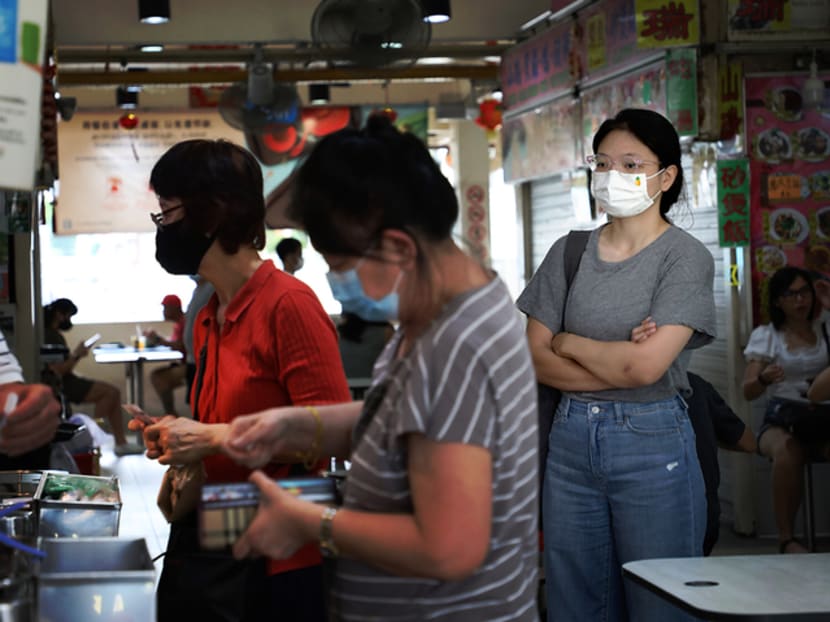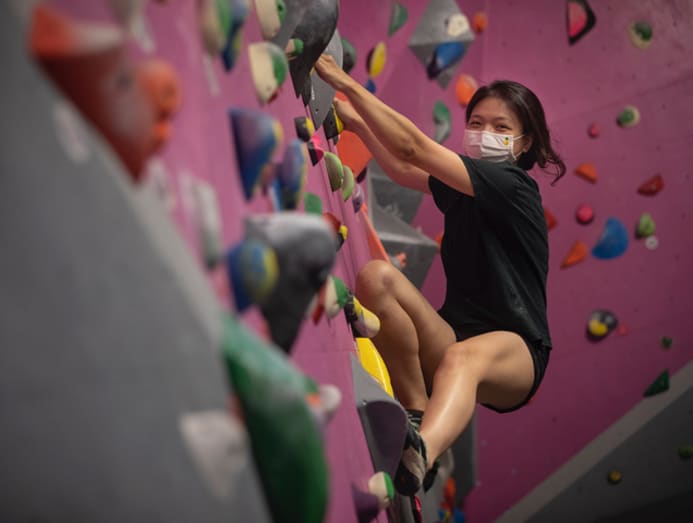Adulting 101: I lost my cool in public but learnt I am not alone in experiencing ‘pandemic rage’

TODAY senior journalist Wong Pei Ting (right) searched for an explanation when she lost her cool at a coffee shop in June 2021. (Photo: CNA/Nuria Ling)
Adulthood is an invigorating stage of life as young people join the workforce, take on more responsibilities and set their sights on the future. But its many facets — from managing finances and buying a home to achieving work-life balance — can be overwhelming.
In this series, TODAY’s journalists help young Singaporeans navigate this stage of their lives and learn something themselves in the process.
SINGAPORE — Last month, when dine-in and gym restrictions were still in force, I lost my cool in public, at a coffee shop, which was completely out of character.
It started when a woman cut into the queue ahead of me. Just as I was about to confront her, she turned to ask if I was in the queue and I offended her with my curt reply: “Obviously.”
It threw her into a fit. As she stepped behind me to wait her turn, she called me out for being rude, then tried to get my husband, who was standing in line with me, to agree that I had been rude.
That ticked me off, but I wasn’t about to engage her. With my back to her, I took a few deep breaths to calm myself down, knowing all too well, as an occasional court reporter covering cases of assault, how things can turn out when people add fuel to the fire.
But when she wasn’t getting a satisfactory answer from my husband, she concluded on her own terms and said: “Thank you. As long as you agree that your wife was rude.”
Boy, did that make my blood boil. For a minute, I kept my composure as my turn came to order my takeaway.
But rage somehow took over the second I was done. I made it a point to brush past her, making light but unmistakable contact with her as I left, intent on showing my displeasure.
Thankfully, the woman did not retaliate, and I left the coffee shop without causing a larger scene that could have left me feeling sorry at a police station and perhaps gaining online notoriety, too.
Once we found a private moment to reflect on the incident, my husband’s take on it hit me like a ton of bricks. “Why did you have to knock into her? What’s the difference between that and you punching her?”
I thought I had a good handle on my emotions just before I acted out. I was taking longer breaths and settling my mind before things unravelled.
Furthermore, I had never lost my temper before in public. Friends don’t know me as a volatile person and more than one colleague had told me that they couldn't imagine me being angry as I often carry a cheery disposition.
As it turned out, mine was a classic case of “pandemic rage”. Psychologists got me to think of it as akin to road rage, striking at places where strangers still interact with one another despite the restrictions of Covid-19, such as in supermarket lines.
GROWING IRRITABILITY
The monthly American magazine Washingtonian recently defined “pandemic rage” as “the possible belligerence and frustration that comes with releasing a bunch of raw-nerved, on-edged bodies back into the wild”.
In an opinion piece published in Britain’s The Guardian newspaper last month, novelist Francine Prose ruminated on this topic as well after a stranger threatened to beat her and her husband up at the checkout area of a grocery store.
Among my friends, there was no shortage of anecdotes on the new level of craziness they have faced in the midst of the hurry to return to life as we knew it before the pandemic.
One told me that she saw someone lashing out at a domestic worker at Ikea store, and she has heard her neighbours yelling hysterically at each other when their children are not around.
Another friend told me she had almost screamed at a man for hogging a treadmill at her condominium gymnasium.
Sometimes, rage is a slow burn. A colleague revealed that he had started engaging in passive listening when his loved ones were talking simply because he is around them all the time, working from home and unable to take time off to travel.
Another colleague divulged that she started muting those who post updates about their married or parenting life on Instagram this year, feeling that they should suffer in some way because she hadn’t made any progress as a single looking to settle down all year.
“Of course, I get that not everything is shown on social media. But, hey, disportionate rage and irritability knows no logic,” she said.
HOW ANGST GAVE WAY TO RAGE
What in the world is causing these aberrations?
Mr Praveen Nair, a psychologist at Raven Counselling and Consultancy, has a theory.
He said that the civilised world had found an equilibrium between order and chaos after people took thousands of years to make things simpler, more convenient, stratified, organised and hierarchical. Then, Covid-19 came along and swung it back to a state of chaos.
In such a state, portrayed at its extreme in zombie apocalypse movies, people “become more scary than zombies sometimes” because our instinct for self-preservation kicks in and people look out for themselves and turn against community interests, he added.
And the chaos doesn’t have to be triggered by extraordinary events. The trigger can be the removal of an activity we normally take for granted such as enjoying a movie at the theatre, having a meal outside or heading to the gym.

TODAY senior journalist Wong Pei Ting during a bouldering workout. This was part of her routine until Covid-19 restrictions did not allow her to do this for a period. Photo: Nuria Ling/TODAY
In my case, before the episode with the woman, I had been going about life for slightly more than a month without my newfound post-pandemic routine of bouldering, an indoor type of rock climbing, twice or thrice a week, since indoor gyms had been ordered to shut.
Mr Nair also highlighted several pandemic-specific factors that could have compounded the problem. Mask-wearing, for example, obscures facial expression, making it easy for people to misconstrue glances as stares. Economic anxiety and constant reminders of the impermanence of life in the news could also play a part.
Psychotherapist Nicole Chew-Helbig said that rage is often mistaken as anger, but it is really “anger stuffed away”. Anger is a calm, necessary and constructive emotion that can be directed, but rage is “pure destruction”.
This reminded me that many of us had been suppressing our sense of loss by telling ourselves: “I shouldn’t be sad. I have a job. I am healthy. My family is healthy.”
Mr John Shepherd Lim, the chief wellbeing officer of Singapore Counselling Centre, said that underlying layers of social angst are affecting even those largely unaffected by the Covid-19 crisis.
This angst, he added, is what sociologists may call a state of anomie, where societal norms and values are broken down due to high levels of uncertainty in society and people. It can easily result in public outbursts, “much like a spark that sets off a powder keg”, he said.
PRACTICAL TIPS
Is there anything we can do to keep this potentially explosive aspect of our lives in check?
Mr Lim said that although it might seem overly simplistic, deep breathing is an effective way to help us calm down, because it slows our heart rate and tells the brain to relax and the body to loosen up.
His centre recommends the “4-2-6” breathing technique: Breathe in deeply for four counts, hold for two counts, then exhale fully for six counts. This briefly diverts our attention from the source of anger and gives ourselves a time-out before facing the situation.
We may also calm down by stepping away from the person or situation momentarily to give us some space to breathe, he added.
Agreeing, Mr Nair advises counting to 10 before reacting or using our non-dominant hand to type on the phone to slow down the thought process.
The experts highlighted the importance of examining the root of the rage event. Ms Chew-Helbig said that it can be something wholly unrelated to the trigger event such as childhood trauma, when you felt trapped or abandoned.
Mr Lim said that if the root situation is controllable, we can take action to improve the situation or relationship so that we decrease our negative emotionality in the long run.
And if the root situation is uncontrollable, such as when others continue to think poorly of us despite efforts to explain or if the pandemic roils on, “letting go” would help, he said.
Learning to let go, he stressed, is not suppressing our emotions because it requires us to address the situation at hand.
“Rather than disregarding our negative feelings or invalidating it, it is about facing up to the reality of what is going on around us, while at the same time acknowledging that it is pointless to be bent on controlling uncontrollable things.”
When faced with the frustration of the pandemic that seems to be dragging on with no end, Mr Lim said that we can learn to focus on making the most of the current situation — improving our relationships with family members, talking through things with them rather than avoiding them, and spending more time with ourselves through personal reflection activities and goal-setting.
Dr Daniel Fung, chief executive officer of the Institute of Mental Health, said that leading a healthy lifestyle in which you eat well, have enough rest, sunlight and exercise is a good start.
He added that it is important not to medicalise all negative emotions, “otherwise, we will all be looking for a pill to manage our feelings”.
Ms Chew-Helbig suggested that a little compassion could go a long way in addressing collective rage. Apart from becoming less judgemental of others, we can be compassionate towards ourselves and take these challenging times as an “opportunity to evolve”.
To the woman in the queue, I am sorry to have lashed out at you unnecessarily. I hope you are doing okay.
ABOUT THE WRITER:
Wong Pei Ting is a senior journalist at TODAY focusing on issues relating to transport, education and social affairs.








